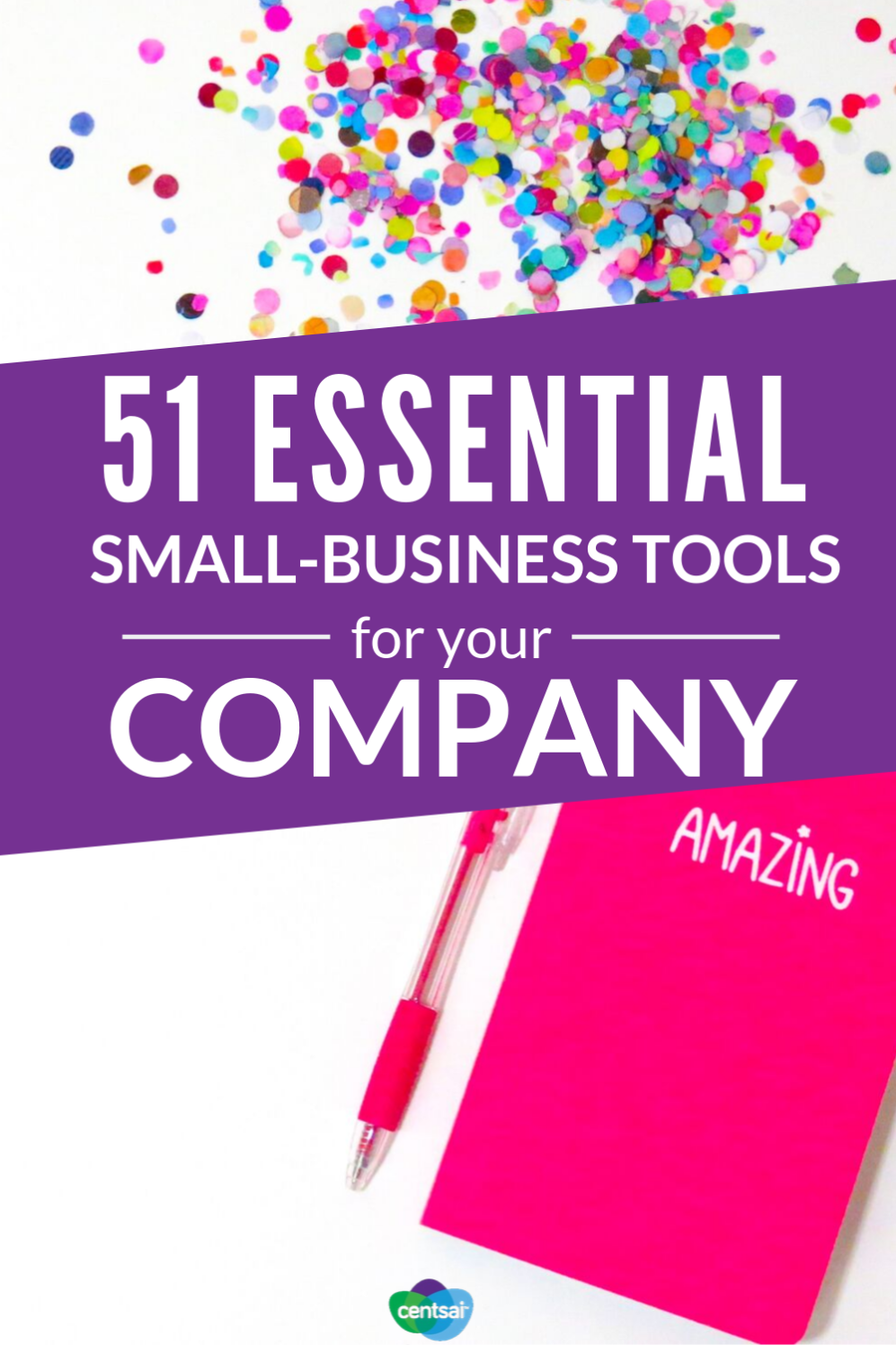 It all starts with an idea. It’s a great idea, to be sure. But how are you going to get the idea to the people, your customers? How will you market your idea? Implement it? Schedule it? Pay for it? And deliver it on time?
It all starts with an idea. It’s a great idea, to be sure. But how are you going to get the idea to the people, your customers? How will you market your idea? Implement it? Schedule it? Pay for it? And deliver it on time?
Poor management and inadequate cash flow are a few of the top reasons start-ups go under, according to a study by business analysis research firm CB Insights.
Thankfully, it’s super easy to streamline these issues, thanks to the power of Web 2.0 and the advent of smartphone apps. But a good business can’t run on tools alone. Combine them with your awesome team and there’s no limit to what you will accomplish.
Here is a batch of great small-business tools that will get your enterprise where it needs to be.
 Social Media and Email
Social Media and Email
Getting your business in front of the right eyes is more important than ever, especially in an age when digital marketing reigns supreme. So, a social media presence is essential. These apps will make you nothing short of a Twitter wizard, Instagram influencer, or email expert:
- TweetDeck is the premier in-house scheduling platform for everyone’s favorite (or least favorite) microblogging platform. It’s a fantastic app for businesses with multiple Twitter accounts, letting you browse both dashboards without having to manually sign in and out again. This allows you to interact and engage with potential clientele from a variety of brand voices. It’s easy to use, offers a clean interface, and is a godsend for scheduling tweets in advance. And did I mention it’s free?
- Later is an all-in-one social media planning platform that includes scheduling tools for Instagram, Facebook, TikTok, LinkedIn, and Pinterest! It also enables you to use the “Link in Bio” tool when you want to direct users to use the link you’ve set up in your bio on these platforms. It’s especially useful for Instagram, but the recent additions of other platforms are nice too. It’s got a user-friendly interface, so scheduling and planning posts can be done with ease. Best of all, you can create a free account and then decide which tier suits your company!
- Hootsuite has long since been one of the premier social media management tools available. At one point, they were the only tool of its kind but these days, they have several competitors which we’ve included below. In addition to social media planning, Hootsuite includes an image gallery, so you don’t have to go scrambling for images to accompany your posts. It also includes social media analytics tools that enable you to see how well your content is performing. It will also tell you the best times and days to post your content while you’re planning and scheduling. You can also engage and interact with users right from within Hootsuite! (Pro tip: Hootsuite is always running some sort of special and currently, they’re still running a “Cyberweek” deal with a 90-day FREE trial! Just move your mouse as though you’re about to close the page and a pop-up will offer you this deal!)
- Sprout Social is a robust, cross-platform social media management tool that lets you post about your brand on Facebook, Twitter, LinkedIn, and Instagram simultaneously. Couple that with data insights and you can see when, where, and with whom your content is resonating best. It’s not a free service (a professional account will run you $149), but it’s worth every penny.
- Buffer is like Sprout in how it allows cross-platform posting and analytics, but it offers a dynamic team management option that lets you bring on fellow employees to help with the posting. It’s good for businesses that are starting to build their social media and communications teams and that need a tool that accommodates everyone. Small-business plans are cheaper, too, at $99 a month.
- Lately employs artificial intelligence to assist with content rollout across social media platforms, giving it a leg up on similar services. Couple that with its ability to automate posting, and all you’ll have to do is draft some tweets. The robots take care of the rest. It’s $129 for a professional membership, but it’s one of the more dynamic social media platforms on the market.
- Mailchimp is an excellent tool of email campaign experts and podcast listeners everywhere, and it’s fantastic for conducting A/B testing and getting a handle on what message is resonating and with whom. It prides itself on providing reports that let its users get better and smarter with each campaign so you can continue to reach the right demographic. You can use it for free for up to 2,000 subscribers, but it’s $10 a month for unlimited.
- Instasize takes Instagram’s already impressive photo editing tools and ratchets it up to 11, allowing users to edit and crop their images to look their best in-app. With Instagram’s preference for a 1:1 aspect ratio when viewed on a smartphone, Instasize is a great free tool for making your images pop and stand out on a platform already laden with photos of dogs and food. It’ll cost you a low $4.99 a month.
- ProtonMail is perfect for the more … careful among us, offering encrypted email services and data storage. Let’s see the hackers try to get into those emails. A professional account is $80 annually.
 Transportation
Transportation
Whether you’re going to a meeting across town or driving to the airport to jet off and meet investors, transportation apps are lifesavers for getting from point A to point B, especially if you’re tracking your expenses:
- Uber for Business lets you track transportation expenses by user. It also keeps receipts of all rides in your online account. No more rifling through old email trying to find that one receipt — it’s all in the app. Pricing varies depending upon the length of your car ride.
- Lyft Business offers similar functionality, but it’s always good to have options. Especially during surge pricing.
- Via is a ridesharing option with an emphasis on carpooling. As such, it’s a cheaper taxi option than both Uber and Lyft. This makes it great for companies that want to offer commuter benefits at an affordable cost. Rides can be as cheap as $5 for a short distance.
- The Transit App is a solid choice for logistical planning in cities with historically unreliable transportation schedules. It gives its users real-time updates on train arrivals, so you won’t miss that life-changing meeting. Free to download.
- Zipcar is the go-to rental car service, perfect for getting to a corporate retreat out of town or making some last-minute deliveries. Its business profile options can be tweaked to fit your Need for (Business) Speed. That said, it starts at $99 per driver per year, with reservations costing anywhere between $7 and $10 per hour (depending on the car).
 Scheduling
Scheduling
Making a plan and sticking to it while juggling everyone else’s responsibilities is always tough. Just ask any millennial who’s been tasked with coordinating Sunday brunch. Thankfully, the following apps take some of the headache out of scheduling your meetings:
- Deputy is killer for allowing employees to chat with one another about trading shifts and shows you the day and month at a glance, so you know who’s working where. It’s a reliable alternative to the old punch card and lets employees clock in with ease. At $4 per user per month, it’s almost a steal.
- Google Calendar is perfect for companies already using the G-Suite line of products (like Google Drive or Gmail) as it seamlessly integrates across platforms and devices. You can send invites to colleagues via email and once accepted, they appear automatically on their calendar. Very nifty indeed. Like many other Google services, it’s totally free.
- Microsoft Outlook is the alternative to Google Calendar that’s better suited for businesses that contract out to government organizations, many of which use the Microsoft suite for organization and productivity. Like with Google, invites can be sent via email and appear automatically on the calendar when accepted. A premium subscription is only $12 a month for a year.
- Doodle is a free online tool for scheduling one-off meetings. You send a link to a Doodle form where your invitees indicate when they can and cannot meet. It’s all web-based so it works on any computer and is easy to use — an excellent tool for scheduling meetings outside your organization, with people who may not use your in-house calendar management system.
- Calendly is good for the outward-facing side of your business. It works well if your business revolves around making appointments with clients. You share a link, clients fill out their availability, and it’s added immediately to your calendar. To top it all off, it’s super cheap, running $12 a month for a premium account.
 Data Management
Data Management
Your data is extremely important, not just for collaboration but for the continued success of your cutting-edge ideas. Guard it safely with these apps:
- Dropbox was one of the innovators in cloud-based document storage, and it’s still a solid bet for cross-platform sharing, especially if some of your team uses Windows and the other part uses Apple products. You can get more data than you’ll know what to do with (a whole terabyte, or 1,024 gigabytes) for $9.99 a month.
- Google Drive is the industry’s flag bearer for cloud-based document storage, given that you can both store and edit documents in your drive while easily editing the permissions of who gets to see and edit what. It also runs $9.99 a month for 1TB of data. Boy, that’s a lot of data.
- iCloud unsurprisingly also costs $9.99 a month and is best suited for Apple products. If you’re a Macintosh company, it’s a solid bet.
- Office 365 for Business is your go-to platform for sharing and collaborating on documents if your business uses Word and Excel. It integrates well with other Windows applications (like Skype for Business) and will run you $12.50 per user per month.
 Money
Money
Cash rules everything around you when you run a small business. It’s essential to keep everything on the books while looking for places where you can save. Try using these tools to make your small-business finances easier:
- Mint is a free web-based tool for creating budgets and analyzing expenses on a monthly or weekly basis. While lots of people use it to track their personal finance, it can be used for small businesses to effectively monitor how your corporate cards are really being used.
- Wave is a new alternative to dinosaur accounting software like Quickbooks. It’s a free way to send invoices and account for business expenses, and for a $0 tool, it’s surprisingly dynamic. Given that Quickbooks Plus is $50 a month, it’s a great way to keep up to date on bills while saving some cash.
- FreshBooks is another cloud-based accounting software that boasts ease-of-use and a very clean desktop view. It’s also designed with small businesses in mind, and its unlimited Premium plan is a cool $50 a month.
- Acorns is a creative way to channel unused budget funds toward investing. Essentially the app rounds up your purchases to the nearest dollar, investing that change automatically into your stock portfolio. It’s a great tool for freelancers and other self-employed individuals who may lack a traditional retirement investment vehicle, like a 401(k). Acorns is $1 a month for portfolios under $5,000, at which point it will charge you a yearly fee of 0.25 percent of your assets.
- Expensify is helpful for businesses with lots of physical receipts, as it scans, digitizes, and stores receipts effectively to build expense reports. It can save you the trouble of holding onto scraps of receipt paper in perpetuity while giving you peace of mind that every purchase is accounted for. A business account costs $9 a month.
- Honey is something everyone should use, not just small business owners. As a browser extension, it combs the web for promo codes you can redeem when making purchases. You can cut down on business expenses significantly if you get a great code. It’s especially helpful if you buy business supplies via Amazon. Best of all, it’s free.
- PayPal is the premier internet payment app that’s been around the block for many years now. It’s perfect for paying contractors quickly and securely while automatically keeping records of all your payments. You should also use its sister app, Venmo, if you must pay quickly on the go and only have your phone. Both are free.
- is your go-to tool for selling things quickly, letting you hook up a card reader to your smartphone to facilitate purchases and payments quickly and cheaply. Square takes a percentage of the purchase though (usually 2.75 percent per swiped card), so price accordingly.
- Due lets you pay your employees, be they full-time or freelancers, quickly and easily, making it a solid choice for compensating your W-2s and 1099s with ease. Rates per transaction start at 2.8 percent.
 Productivity
Productivity
Gone are the days of follow-up emails and ad hoc project management scattered throughout office correspondence and Post-it Notes. These productivity apps let you manage and delegate tasks with ease, and offer post-completion analytics to continue improving your bizops:
- Wrike is a dynamic app for managing workflows and projects easily. You can build custom workflows that fit your speed, check progress on delegated tasks in real time, and analyze productivity afterward. It’s well suited for creative enterprises who need to share progress on graphics and videos. Its professional plan is $9.80 per user, and its business plan is $24.80 per person for additional features.
- Asana is another great tool for businesses that need to focus primarily on collaboration and productivity, providing timetables, task management, and in-app messaging. It’s a good catchall productivity tool for any business, regardless of industry. Plus, it’s affordable, at $9.99 a person for its premium plan.
- Basecamp streamlines productivity, file storage, and task management into one app, avoiding the necessity of switching between platforms to share and collaborate on documents. It offers clean to-do lists for each team member and is probably the easiest app to use on this list. On top of that, it’s priced at $99.99 a month for as many users as you need, making it a good fit for growing businesses with a shifting roster.
- Minutes is the go-to app for businesses that have lots of meetings, allowing you to provide the most up-to-date agendas and documents. It lets invitees collaborate in real time in assigning deliverables to team members. You can send a personalized task list to all attendees, so nothing falls through the cracks. At $6 per month for a premium plan, it’s a cheap way to get the job done while some of the chaos caused by long hours in the conference room.
- Not to be confused with the previous app, My Minutes is a tool for personal productivity. It lets you allocate time throughout the day to handle key tasks, both in and out of the office. Set aside 30 minutes to check emails, 20 minutes for exercise, and an hour for leisure so you can stay focused without burning out. It’s free, too.
- Clear is a productivity app for making quick lists, but its kind aesthetic presentation (complete with customizable color schemes) avoids the eyesores of default applications like Apple’s Notes. On top of that, the app makes a pleasant bell noise whenever you complete a task, providing a Pavlovian mechanism to reward accomplishments. It’s a sweet $10 on the App Store.
- Evernote is the gold standard of note-taking apps. Seamlessly integrate meeting notes across platforms and users while scanning handwritten ideas with tech that recognizes even a doctor’s script. Its basic service is free, with premium starting at $7.99 a user.
- LastPass is a web browser extension that stores all your passwords automatically, allowing you to utilize different passcodes for different apps. This lets you maintain security while eliminating the search for that secret Word document where you’ve written down all your passwords (which you should delete, by the way). It’s free to use, too.
 Communication
Communication
As much as we all enjoy hovering awkwardly by a colleague’s desk until they finish up a phone conversation, these tools make it easy to communicate with your colleagues while freeing up your time for other business:
- Slack has quickly become the premier communication application for start-ups and tech giants alike. Instant messaging, document sharing, and an emoji selection that keeps it 💯 percent engaging. Pair that with an excellent mobile app and a free-to-use basic plan and it’s a winner.
- Skype for Business works best if you’re using Office 365 as you’ll be able to share file paths to collaborative documents when you’re not checking in on your team members. It boasts the ability to call, video chat, or message anyone with a Skype username, and costs $2 per user per month.
- Google Hangouts is the instant messaging side of Gmail that’s perfect for when you want to send a quick message in real time that’s not a bona fide email. Just like Gmail, it’s free to use as you see fit.
- WhatsApp is an instant messaging tool that works across platforms, avoiding some of the bugs that come with communicating between iOS and Android devices. It’s well-suited for international communication, as it doesn’t incur the usual fees that come with global texting. Plus, it offers end-to-end encryption for total security. It’s also free.
- GroupMe dominates the group project market, allowing you to make quick groups on the fly for mobile communication. Unlike traditional group messages, you can toggle notifications from on to off. This way, you can unplug after the workday without your phone buzzing constantly. Free to use on both Android and iPhone.
 Web Design
Web Design
Once you’ve got your small business up and running, you’ll need a sleek exterior to attract the right clients and partners. You could hire a web designer (which can cost a lot of money) or you can stay frugal with these urbane site designing platforms:
- Wix is a popular, easy-to-use site for designing your webpage, offering video hosting, webstore hosting, and beautiful templates. Plus, when you sign up to host, you get one year of free domain name hosting and use of the Wix logo maker, all for less than $20 a month (or $25, if you have a webstore).
- Squarespace excels in template offerings, with some of the sleekest designs in the business. It lets you tweak your website in ways Wix doesn’t, offering a fully customizable experience. However, it requires a bit more technical know-how. It’s $18 a month for premium, and $26 for e-commerce options.
- WordPress is an attractive option if you want your site to have more of a blog feel, perfect for businesses that want to show the world how their development process is proceeding. Its premium option is $8 a month and is perfect for folks who want a basic, content-driven site for their small enterprise.
 Graphics
Graphics
A picture is worth a thousand words. A five-second video running at 60 frames per second is therefore worth 300,000 words.
Get the right photos and movies on your website to make a lasting impression, with the help of these tools:
- Canva is probably our favorite tool for creating graphics. They have thousands of designs and templates, and you can do quite a bit with the FREE version, too! Canva is fantastic for collaboration as it enables you to share what you’re currently working on with teammates, and you can even allow teammates to make edits to your designs if you want (or, just allow them to comment on your creations). From images to slide decks and from videos to social media posts, Canva has it all and is perfect for small businesses!
- iStock has one of the larger databases of royalty-free stock images on the web, which makes finding the perfect picture a cinch. It has scaled pricing to accommodate your needs, with 10 photos a month setting you back $70 for a one-year subscription.
- Flickr offers free photo hosting and a wide range of images with Creative Commons licenses, many of which you can use for commercial purposes, provided you attribute the author. It’s good if you want to host your business’s images externally, thus cutting down on data usage on your website while still getting access to user-uploaded files the site over.
- Wave Video is a simple browser tool for making eye-catching videos, offering stock footage and music for easy content creation. You can export your videos in aspect ratios suited for all social media platforms. A Pro account costs $16.50 a month, making it much cheaper than most professional video-editing platforms.
- Lumen5 is an effective tool for businesses who want to publish a lot of videos across different social media platforms. Its built in Artificial Intelligence autogenerates visuals to fit your script, cutting down the amount of time it takes to source photos and b-roll. Lumen5 can also create automatic videos from web links and offers a large library of stock photos and clips. A basic account runs $29 a month.
- Snappa is a graphic design platform for creating engaging images, complete with text overlay and photo editing. Its in-house templates are diverse, and a great option for making quick and dirty designs suited for social media. A premium account costs $10.
Putting Your Small-Business Tools to Use
Once you have all the tools you need for your small business, it’s time to get to work.




